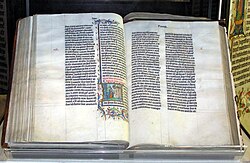This article possibly contains original research. (August 2013) |
| Part of a series on the |
| History of Christian theology |
|---|
 |
|
|
Open theism, also known as openness theology,[1] is a theological movement that has developed within Christianity as a rejection of the synthesis of Greek philosophy and Christian theology.[2] It is a version of free will theism[3] and arises out of the free will theistic tradition of the church, which goes back to the early Church Fathers.[4] Open theism is typically advanced as a biblically motivated and logically consistent theology of human and divine freedom (in the libertarian sense), with an emphasis on what this means for the content of God's foreknowledge and exercise of God's power.[5]
Open theist theologian Thomas Jay Oord identifies four paths to open and relational theology:[6]
- following the biblical witness,
- following themes in some Christian theological traditions,
- following the philosophy of free will, and
- following the path of reconciling faith and science.
Roger E. Olson said that open theism triggered the "most significant controversy about the doctrine of God in evangelical thought" in the late 20th and early 21st centuries.[7]
- ^ G. L. Bray, “Open Theism/Openness Theology,” in New Dictionary of Theology: Historical and Systematic, ed. Martin Davie et al. (London; Downers Grove, IL: Inter-Varsity Press; InterVarsity Press, 2016), 632.
- ^ Clark H. Pinnock;Richard Rice;John Sanders;William Hasker;David Basinger. The Openness of God: A Biblical Challenge to the Traditional Understanding of God (Kindle Locations 1164-1165). Kindle Edition. Location 1162
- ^ Pinnock, Clark H. “Open Theism: What Is This? A New Teaching? and with Authority! (MK 1:27).” Ashland Theological Journal 2002, Vol. 34, pp: 39–53. ISSN: 1044–6494
- ^ Sanders, John (July 30, 2007). "An introduction to open theism". Reformed Review. 60 (2). Retrieved August 13, 2021.
- ^ "A brief outline and defense of the open view". ReKnew. December 30, 2007.
- ^ "Paths to open and relational theologies". thomasjayoord.com. For the Love of Wisdom and the Wisdom of Love. May 13, 2014. Retrieved March 7, 2020.
- ^ Olson, Roger E. (2004). The Westminster Handbook to Evangelical Theology. Westminster John Knox Press. p. 190.
© MMXXIII Rich X Search. We shall prevail. All rights reserved. Rich X Search
